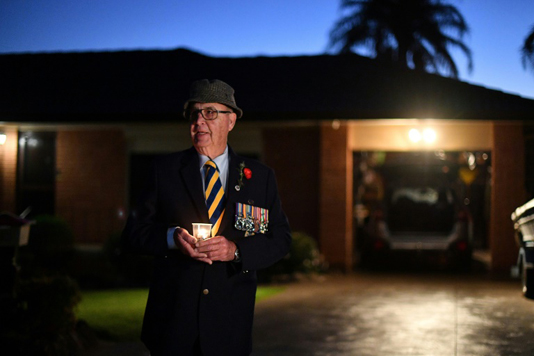SYDNEY, April 25, 2020 (BSS/AFP) – Australians and New
Zealanders held dawn Anzac Day vigils from the isolation of their own
driveways on Saturday to honour their armed forces, unable to gather at war
memorials because of coronavirus lockdowns.
As the sun rose, New Zealand Prime Minister Jacinda Ardern was among
those observing vigils at the end of their driveways instead of the memorials
forced behind closed doors.
“This year, a new threat faces all nations as the impact of the
coronavirus deepens worldwide,” Ardern said from her driveway.
As morning light reached Australia, neighbours held candles outside
their homes in Sydney’s southwest, where Vietnam veteran Peter McFarlane led
a small suburban service, one of the many taking place around the country.
“I can’t remember the last time I missed a dawn service, so I had to
have one here,” the 78-year-old told AFP outside his Ingleburn home.
He said he was “proud as punch” after the whole street turned out to
begin Anzac Day, finishing his early morning memorial with a shot of rum.
While official memorials were held behind closed doors, people
reached out to the Returned and Services League (RSL) that represents
veterans in Australia
to ask how best to mark the day.
“People are very, very active,” New South Wales RSL acting president
Ray James told AFP, “setting up their driveways with poppies”.
Anzac Day marks the 1915 landing of Australian and New Zealand
troops at Gallipoli on the Turkish peninsula in an ill-fated WWI campaign
against German-backed Ottoman forces.
Some 10,000 Australian and New Zealand servicemen were killed in the
failed military campaign but it shaped the close friendship that binds the
two countries.
Marches and memorials traditionally mark the day but as both nations
battle to control the spread of COVID-19, parade routes were quiet.
Poppy-print masks, live-streamed memorials, care packages and even
digital drinking sessions were easing veterans’ sense of loneliness during a
traditional time of camaraderie, James — who served in Vietnam — said.
“We (usually) go away to our various watering holes, pubs or clubs,
and we enjoy our mates… you talk about the old times, whilst you were
serving and you talk about someone who’s missing this year that was there
last year,” he said.
“It’s going to be sad this year because we won’t be able to do
that.” The 71-year-old, who served in the Royal Australian Navy and
then the reserves for a combined 46 years, said he would not be missing out
on Two-up — a traditional game banned for the rest of the year because of
the huge sums wagered on the toss of two coins.
“Playing Two-up on Skype — social media is really good — and also
having a beer or a scotch or two,” he said.



